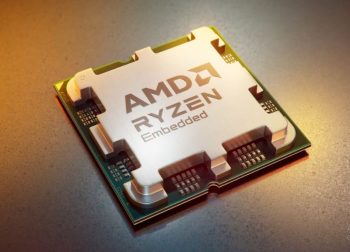
AMD announced at Smart Production Solutions 2023 the AMD Ryzen™ Embedded 7000 Series processor family, optimised for the high-performance requirements of industrial markets. By combining Zen 4 architecture and integrated Radeon graphics, Ryzen Embedded 7000 Series processors deliver performance and functionality not previously offered for the embedded market.
With its expanded features and integration, Ryzen Embedded 7000 Series processors are ideal for a wide range of embedded applications, including industrial automation, machine vision, robotics and edge servers.
A Next-Generation Processor
The Ryzen Embedded 7000 Series processor is the first embedded processor to use next-generation 5nm technology with a seven-year manufacturing availability commitment. The new embedded processor integrates AMD Radeon RDNA™ 2 graphics that eliminates the need for a discrete GPU for industrial applications.
And because embedded applications require additional operating system software options, Ryzen Embedded 7000 Series processors include support for both Windows Server and Linux Ubuntu, on top of Windows 10 and Windows 11. Ryzen Embedded 7000 Series processors also include up to 12 high-performance Zen 4 CPU cores, which combined with its integrated features and wide operating system choices, offers unparalleled ease of integration for system designers.
“Industrial application use cases are continuing to grow in complexity and sophistication and are driving the need for increased processing capabilities,” said Rajneesh Gaur, Corporate Vice President and General Manager, Embedded Processors Group, at AMD. “With the integration of key performance features and a scalable design, Ryzen Embedded 7000 Series processors are ideal for a broad range of applications from advanced robotics and instrumentation design to power control, video surveillance and more.”
“For embedded industrial applications, it is critical to provide differentiated and scalable offerings while still meeting power, performance and budget requirements,” said Kevin Krewell, Principal Analyst at TIRIAS Research. “The new AMD Ryzen Embedded 7000 Series is purpose-built for a wide spectrum of use-cases, making it an ideal choice for industrial applications in a market that will continue to see growth and diversity.”

Supporting Ecosystem
“Advantech is excited to launch its AIMB-723 ATX motherboard. This is the first industrial-grade motherboard integrated with the AMD Socket AM5 chipset, enhancing the capabilities of industrial applications at the edge,” said Linda Tsai, Advantech President of Industrial IoT at Advantech
She added: “The AIMB-723 delivers high computing performance as well as providing the scalability to support up to a three-slot discrete GPU card and an additional three-frame grabber card for machine vision applications. Powered by Ryzen™ 7000 Series processors, Advantech’s AIMB-723 industrial motherboard not only accelerates performance-demanding AOI applications but also caters to legacy requirements for PCI expansion, accommodating a wide range of communication protocols and I/O interfaces.”
“ASRock Industrial, a longstanding AMD partner dedicated to intelligent co-creations, stands as the world’s leading supplier of industrial motherboards and systems. We are thrilled to announce the groundbreaking Mini-ITX motherboard, IMB-A1002, powered by the AMD Ryzen™ Embedded 7000 Series processors with B650 chipset,” commented Handsome Tzeng, President at ASRock Industrial. “By leveraging the power of the “Zen4″ CPU core, AM5 socket, integrated AMD Radeon RDNA 2 graphics, DDR5 memory, and PCIe 5.0, we aim to bring edge performance to exceptional new heights, enabling customers to create leading embedded solutions across a wide range of AIoT applications.”
A Range of New Features and Exciting Capabilities
The Ryzen Embedded 7000 Series processors offer:
- Zen 4 architecture, featuring up to 12 high-performance CPU cores
- Integrated Radeon RNDA 2 graphics 1WGP @2.2GHz max
- AM5 socket, LGA 40mm x 40mm, 1718 pin
- TDP from 65W to 105W
- Support for Dual-Channel ECC DDR5 memory at speeds up to 5200MT/s
- Up to 28 lanes of PCIe® 5 connectivity on-chip
 (0)
(0) (0)
(0)Archive
- October 2024(44)
- September 2024(94)
- August 2024(100)
- July 2024(99)
- June 2024(126)
- May 2024(155)
- April 2024(123)
- March 2024(112)
- February 2024(109)
- January 2024(95)
- December 2023(56)
- November 2023(86)
- October 2023(97)
- September 2023(89)
- August 2023(101)
- July 2023(104)
- June 2023(113)
- May 2023(103)
- April 2023(93)
- March 2023(129)
- February 2023(77)
- January 2023(91)
- December 2022(90)
- November 2022(125)
- October 2022(117)
- September 2022(137)
- August 2022(119)
- July 2022(99)
- June 2022(128)
- May 2022(112)
- April 2022(108)
- March 2022(121)
- February 2022(93)
- January 2022(110)
- December 2021(92)
- November 2021(107)
- October 2021(101)
- September 2021(81)
- August 2021(74)
- July 2021(78)
- June 2021(92)
- May 2021(67)
- April 2021(79)
- March 2021(79)
- February 2021(58)
- January 2021(55)
- December 2020(56)
- November 2020(59)
- October 2020(78)
- September 2020(72)
- August 2020(64)
- July 2020(71)
- June 2020(74)
- May 2020(50)
- April 2020(71)
- March 2020(71)
- February 2020(58)
- January 2020(62)
- December 2019(57)
- November 2019(64)
- October 2019(25)
- September 2019(24)
- August 2019(14)
- July 2019(23)
- June 2019(54)
- May 2019(82)
- April 2019(76)
- March 2019(71)
- February 2019(67)
- January 2019(75)
- December 2018(44)
- November 2018(47)
- October 2018(74)
- September 2018(54)
- August 2018(61)
- July 2018(72)
- June 2018(62)
- May 2018(62)
- April 2018(73)
- March 2018(76)
- February 2018(8)
- January 2018(7)
- December 2017(6)
- November 2017(8)
- October 2017(3)
- September 2017(4)
- August 2017(4)
- July 2017(2)
- June 2017(5)
- May 2017(6)
- April 2017(11)
- March 2017(8)
- February 2017(16)
- January 2017(10)
- December 2016(12)
- November 2016(20)
- October 2016(7)
- September 2016(102)
- August 2016(168)
- July 2016(141)
- June 2016(149)
- May 2016(117)
- April 2016(59)
- March 2016(85)
- February 2016(153)
- December 2015(150)
